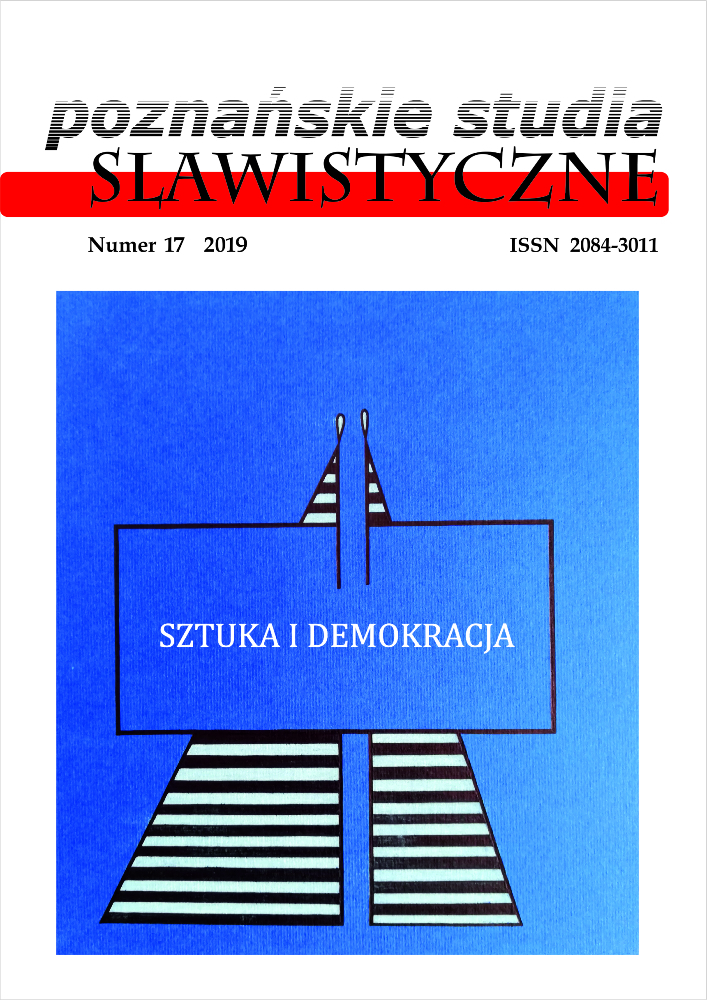Abstract
One of the central notions of the post-Yugoslav literature is the status of democracy in national states formed after the breakup of Yugoslavia. From the perspective of the exile, not only as banishment, but also as a liberating outside view into the once common social, cultural and political space, the post-Yugoslav writers question the social democracy praxis in their former home states comparing it to the social practices in the states of their current residence. In her books of essays, Dubravka Ugrešić ironizes different forms of social ideology in Croatia from the beginning of nineteen-nineties. Her writing recognizes the standards of European democracy accompanied with the ideological view into the questions of social rights, religion and language as the stumbling block of modern society. Ugrešić describes democracy as a notion hiding different things: the praxis of ruthless capitalist exploitation, loss of media freedom, media manipulation, the censorship of corporate capitalism, production of lies, modern slavery... (Don’t take it personal, 2014), validating in her essays the importance of literature in disclosure of autocracy masked as democracy.References
Fukuyama, F. (1992). End of History and the Last Man. New York: The Free Press.
Kolanović, M. (2008). Kome treba ‘identitet’? Esejistika Dubravke Ugrešić. „Književna republika“ br. 3–4, str. 153–162.
Kolanović, M. (2011). »Naš« obračun sa socijalizmom. Postsocijalistička književna artikulacija (europskoga) socijalizma. „Studia Lexicographica“ god. 5, br. 1 (8), str. 86–102.
Kovačević, N. (2008). Narrating Post/Communism: Colonial Discourse and Europe’s Borderline Civilization Potentialities. London – New York: Routledge. https://doi.org/10.4324/9780203895252
Lukić, J. (1996). Women-Centered Narratives in Contemporary Serbian and Croatian Literatures. U: Engendering Slavic Literatures. Ed. P. Chester, S. Forrester. Bloomington – Indianapolis: Indiana University Press, str. 223–245.
Lukić, J. (2001). Pisanje kao antipolitika. „Reč“ br. 64, str. 73–102.
Polić, V. (2018). Dubravka Ugrešić: Boundaries of (Post)Memory, Self, and Nation. U: Women’s Narratives and the Postmemory of Displacement an Central-Eastern Europe. Ed. S. Mitroiu. Palgrave: Macmillan, str. 173–196. https://doi.org/10.1007/978-3-319-96833-9_8
Škvorc, B. (2010) Multikulturalnost i multikulturalizam u postkolonijalnom „stanju stvari“: Dislocirani identitet, pričanje zajednice, književnost i druge Hrvatske. „Časopis za hrvatske studije“ vol. 6, str. 69–112.
Ugrešić, D. (2000). Biti izvan (pitanja postavljala Ana Ristović). „Reč“ br. 60, str. 111–122.
Ugrešić, D. (2002). Američki fikcionar. Zagreb: Konzor – Beograd: Samizdat B92.
Ugrešić, D. (2005). Nikog nema doma. Zagreb: Devedeset stupnjeva.
Ugrešić, D. (2007). Uvod u demokraciju. „Reč“ br. 75, str. 5–39.
Ugrešić, D. (2014). Don’t take it personal. „Peščanik.net“. https://pescanik.net/dont-take-it-personal/. 25.11.2018.
Zorić, V. (2016). The Rhetoric of Exile. Duress and the Imaging of Force. Cambridge: Legenda.
License

This work is licensed under a Creative Commons Attribution-NoDerivatives 4.0 International License.

